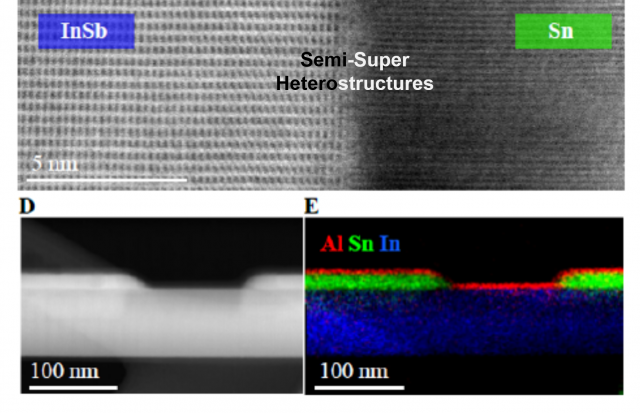
Superconductor-Semiconductor Heterostructures
Coupling a superconductor to a low-dimensional semiconductor creates a hybrid system where charge carriers experience both superconducting and semiconducting behavior. When a semiconductor with strong spin-orbit coupling is proximity-coupled to an s-wave superconductor, theory predicts the emergence of a topological superconducting phase—a platform with potential applications in topological quantum computing. Our group designs and fabricates such superconductor–semiconductor heterostructures using molecular beam epitaxy (MBE), and investigates their electronic structure and transport properties in mesoscopic devices.
We are particularly interested in using these materials to fabricate lateral and multiterminal Josephson junctions. These devices exhibit unconventional phenomena, such as the superconducting diode effect. Moreover, their Andreev bound state spectra can host tunable topological phases, making them a highly promising platform for exploring synthetic quantum matter.
We are also interested in exploring the tunability of these systems for quantum information applications. The ability to control the carrier density of superconductor-semiconductor heterostructures with an electrostatic gate brings up the possibility of making gate tunable qubits (gatemons) and parametric amplifiers.
Relevant Publications
Evidence of -Josephson junction from skewed diffraction patterns in Sn-InSb nanowires
Large second-order Josephson effect in planar superconductor-semiconductor junctions
Selective control of conductance modes in multi-terminal Josephson junctions
Topological Qubits (Majorana Fermions)
Majorana particles are a unique class of particles which are their own antiparticles. The quasi-particles emerge from the topological nature of systems and are bound at zero energy. They are predicted to obey non-abelian braiding statistics such that they can "remember" their histories. A pair of Majorana fermions represents a single qubit, and if realized could lead the way to fault-tolerant quantum computing.
Coupling a superconductor to a semiconductor results in a localized region where charge carriers feel the physics of both materials. A low dimensional semiconductor with large spin-orbit proximity coupled to an s-wave superconductor is predicted to result in a topological superconductor. This new class of material may lead to topological quantum computers. Our group designs superconductor-low dimensional semiconductor heterostructures, implements their growth by molecular beam epitaxy, and studies their electronic properties and transport in mesoscopic devices.
Relevant Publications